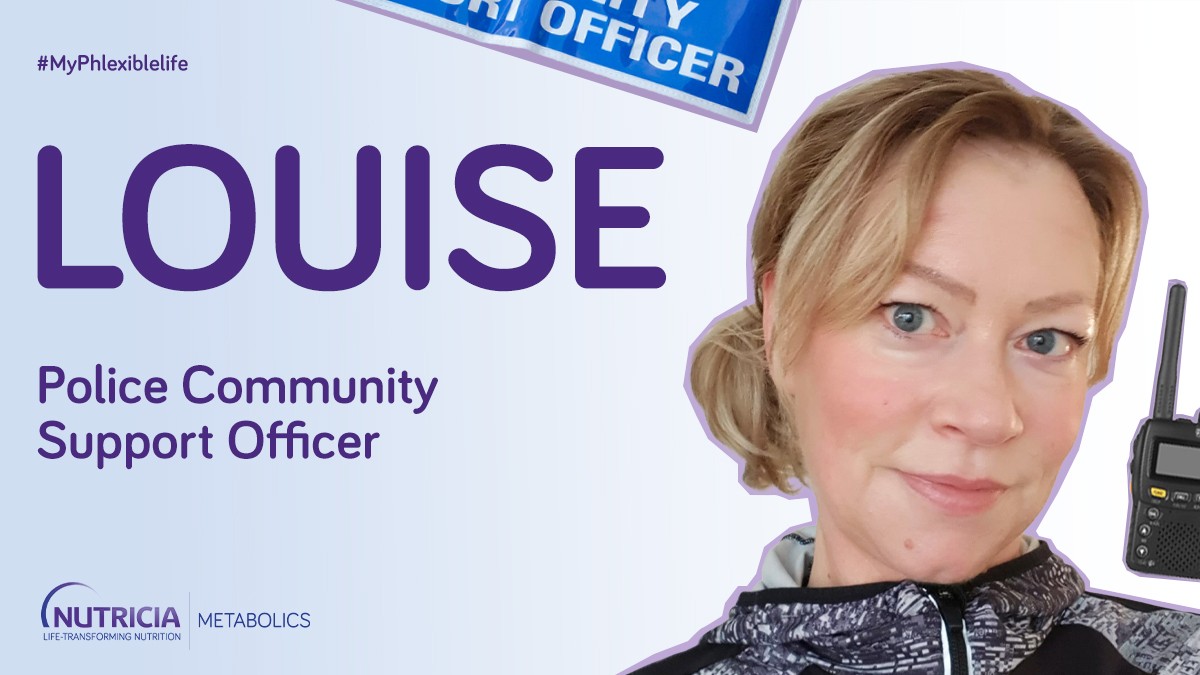
#MyPhlexiblelife - Louise's Story
Louise has been a member of the police force for 23 years, currently serving as a Police Community Support Officer (PSCO). She was born in the West Midlands, where at the moment she is on a canal boat as she prepares to move house. She is married and loves walking her dog, as well as keeping fit with running, weights and yoga.
I first became aware that I had PKU when I was four or five years old, at primary school and I think it was explained to me by my parents saying “you've got to follow this special diet” - in fact, I remember that's what I used to say to my little friends: “I'm special - I can't eat that!”
I started to realise something was different because I would come home for lunch, while my friends would stay at school for cooked dinners, which obviously I couldn’t do. It was really handy though because we literally lived around the corner from school and it was quite nice to go home and watch a bit of telly for an hour.
I had a chat with my mum and dad about what it was like for me growing up, and my dad reminded me that when I got to the stage where I was taking a packed lunch to school, the only bread I could have back then came in a tin - it was called Rite Diet. You had to put it in the oven in a tray of water and sort of cook it, but the bread was round and that absolutely mortified me! I didn’t want to take round sandwiches to school and have everybody asking me “what on earth are you eating?” I used to make my parents slice the bread lengthways so it would be square; that’s the only thing my dad says I was very particular about - how my bread was cut, and making sure it looked as normal as possible.
The only times I felt a bit excluded was when I got older and went to middle school, when they started having residential trips and things like that. I could never go on those - although, looking back, I probably could have done - but at the time both me and my parents were thinking “Oh gosh, we can't do that, because then we'd have to do this, this and this.” So that's the only thing that I ever felt like I was missing out on, because one or two of my friends did go on every residential trip the school did. Obviously there were some kids that never went on any, but there were definitely one or two trips I’d have liked to have gone on.
I don’t recall ever trying to eat anything I wasn’t allowed to - I was really, really strict with myself. It was a bit of a panic for my mum and dad when I was first diagnosed because I was three weeks old and I had to go into hospital for about a week to get my blood levels down. So they were very, very careful with me, and as a result I was very aware of things I wasn’t allowed to have and had a strict mentality of “I can’t even touch that!” Things were different with my sister though; she was born nine years later in 1982 and had PKU as well - at that time we were the only family in the whole of the West Midlands that had two siblings with PKU.
My sister used to have a tent that she’d put up in the back garden for her and her friends to play and camp overnight - I think they would have been in their early teens or something like that. My dad used to mix our protein substitutes for us each day, bless him, then he’d take them out to her and she’d disappear in the tent with it and give it back when she’d finished. She’s only just told us this in recent years, but some of the time she was just chucking it out the back of the tent into the garden! It’s quite funny now, but if my parents had known at the time they’d have been shocked: “Oh my God, you can’t do that - we’re gonna have to mix it all again!” I suppose I would have been trying to keep her in check a bit as well, but she was very wilful and did what she wanted.
I started working for the police in 1998, and before I became a PCSO I was working in the front office and the control room, which was full shifts - earlies, lates and nights. So covering the low protein diet was a bit of a nightmare, and at times I didn’t feel well at all, although I think it was more from exhaustion than anything else. We had to work two days, two lates then two nights, and I don’t think working nights suited me - it made it really hard to follow the diet because I couldn’t get into any routine, and I was having a lot more protein than I should have. But even though working in the control room was often highly pressured - getting patrols to 999 incidents and so on - I absolutely loved it. Even though my diet wasn’t the best, I was still having all my protein substitutes and staying very focused to do that job, so I’m really quite proud of that.
These days, as a PCSO, shift work still makes it very hard to get into a routine, but I’ve learned to be more relaxed about my diet because of time constraints. I do my best to prepare foods to take to work and some days I do really well; I'll make a low-protein pasta meal or low-protein risotto or something. But doing that I find I can spend all my morning - if I’m on a late shift, say - just prepping foods to take to work, and then I take a quick walk with a dog and that’s it; it doesn’t leave much time for keeping fit and training with running, weights and yoga, which I love. Sometimes I get into work and there’s a colleague who’s into the same things as me, and she's like, “Oh, I've run three miles this morning and I've done this workout and that workout,” and I'm like, “Mm. Okay. I've walked the dog.” So that's the time it affects me negatively, is that I don't get to do as much as I'd like on my time, because I should be prepping food.
Some days I do think “Stuff it, I'm going to go for a run,” and then I'll end up buying a normal sandwich or something and eating what I shouldn’t. But I find as long as I have my protein substitutes as well that I feel okay to be honest. One of the dietitians explained it to me by saying that if I do have a high protein meal, but then have my protein substitutes within a certain amount of time afterwards, apparently it sort of wraps itself around the food that you've had and can ‘mask’ the protein. So if I do end up having something I shouldn't have, I still always take my protein substitutes so that I know I'm getting all the vitamins and minerals I need, and Omega-3 and stuff like that.
We’ve sold our house and are living on a canal boat until we make our next move, so we’ve been stressed up to the eyeballs recently. There are times when my husband and I have been sitting down to eat and he’s got something that’s giving me a bit of food envy, and I’ve turned round to him and say “God, I hate this diet,” and bless him he says “Well, yeah, I’m not surprised.” But that doesn’t happen that often. It was more when we moved and I was trying to stick to the diet rigidly, and with everything going on my stress was through the roof - that’s when I decided “Right, enough’s enough. I’m just gonna try and relax, and if I end up having the odd meal that I shouldn’t, then so be it.” I decided I’m just going to keep taking protein substitutes and go by how I feel rather than anything else.
Having a sister with PKU has definitely helped, because we can sort of commiserate with each other about how we’re feeling - whether that’s food envy, or we know we’ve eaten too much protein and are feeling dreadful; we describe it like PMT almost, just feeling moody, angry, emotional. When we were younger my sister didn’t follow the diet as strictly as I did and used to cheat. It’s funny now that we’re adults, she doesn’t think she can tolerate as much protein as me. So if I have one high-protein meal, it doesn’t affect me as much if I then stick to my protein substitutes and my normal exchanges afterwards. But if my sister has just one high-protein meal, she says she usually feels awful the following day. I’m wondering if that has something to do with her not being as strict growing up as I was, but it just goes to show how different people’s experiences of PKU can be.
I asked my mum and dad if they had any advice for parents of children with PKU and my mum said “don’t panic.” My dad’s advice was just to bring your child up as normal, because the only difference at the end of the day is what they eat; everything else about them is going to be normal and healthy - even healthier than a lot of people, if they’re eating lots of veggies and fresh stuff.
I would never consider PKU to be an illness or a disease, and it annoys me when people refer to it like that. I’ve turned around to people and said “Oh, okay - do I look diseased? Because I certainly don’t feel diseased.” It’s not a disease, it’s a dietary condition - and as long as the diet is followed strictly enough, then everything’s good.
Disclaimer: The views/opinions presented are solely those of the individual and do not necessarily represent those of Nutricia.
